Paniponi Dash: Volume 3 - Class of Death
Introduction
As sure as night follows day, so volume 3 follows volume 2, and more Paniponi Dash visits my DVD player hoping for my approval. Approval isn't readily forthcoming though, or if it is, only reluctantly. Paniponi Dash is one of those zany, surreal high school comedies, with a greater focus on weirdness, and less of one on story or character development. It's all well and good if you like a dose of the weird stuff with your comedy, but so far I've found it hard to find a hook into the series, as it's harder to relate to caricatures than to characters. Hopefully volume 3 will do something to remedy that.
Rebecca Miyamoto is an MIT graduate who is returning to Japan to teach at Momotsuki (Peach Moon) Academy. She'll be the homeroom teacher to class 1-C, and to keep her company, she has her melancholy toy rabbit, Mesousa. The only problem is that she's only eleven years old. Well that's not the only problem. The school is zany weird, her class is full of weirdoes that keep making her cry, and all the while, an alien spaceship watches from orbit, determining the future of the human race depending on how Becky performs. And while the class may be thrilled to have a genuine omega cute mascot of a schoolteacher, Becky's prone to tantrums, foul mouthed tirades and sheer obnoxiousness.
This third volume of Paniponi Dash from ADV comes with plenty of extras, and four episodes, where when it appears that Number 6 (Sayaka Suzuki) has a boyfriend, the rumours begin to fly in class; Becky gets depressed when she realises she has no dreams in life, and then Himeko gets hit by an alien truth ray, and everyone finds out what her dreams are; The Bancho association attack the school, and the big talking cow wants a one on one battle with Becky; with the cafeteria closed, there's no food easily available. It's time for pack lunch, and Becky's sister's lunches are scary, so she'll need to convince one of her students to cook for her.
The four episodes on this disc include
11. Inscrutable Are the Ways of Heaven
12. There Are No Classes Among Humans But There Are In Human's Hearts
13. The Wages of Sin Come Like the Tip of a Needle
14. Hugging a Stone and Jumping into an Abyss
Picture
It's a Region 1 disc, so as you would expect Paniponi Dash gets a 1.78:1 anamorphic transfer in the NTSC format. You have a lower resolution, and with it an imperceptible flicker to deal with (for some people), but you get to live without the conversion artefacts like ghosting, softness, and judder. Paniponi Dash is a visual explosion of a show, and having seen Shaft productions like Moonphase, Negima!? and Natsu no Arashi, that's really saying something. The character designs may be simplistic, but surreal is the order of the day with the animation. Anything goes, the screen is always filled with visual gags, the school blackboard offers countless opportunities for humorous graffiti (translated by the captions, explained by the Vid-notes), and breaking the fourth wall is the order of the day. The school is often portrayed as a television studio (on one occasion a member of the crew wanders on set in the middle of the take, then hurriedly sneaks off again). It's also replete with pop culture references and winks to the audience. It's a frenzy of a show that makes you glad for the invention of the pause button, just so you can take it all in.
Sound
You have a choice between DD 5.1 English and DD 2.0 Japanese. As for subtitle tracks, you have minimal signs, full signs, optional translated subtitles with minimal signs, optional translated subtitles with full signs, oh, and the AD Vid-notes tracks as well. The difference between the minimal and full signs is that more of the background blackboard gags get translated, and some people may not want the extra distraction from what's happening in the foreground. Also, the vid-notes come with a popping sound, so that means the audio tracks are here in duplicate (with added pops).
I went for the Japanese track, and as usual was happy enough with that, with some interesting character voices livening up the show. As for the English dub, I survived about 10 minutes of it. Taking a leaf from Excel Saga, ADV's approach to Japanese anime comedy is to make it as loud as possible, which quickly gets annoying. Also a 5.1 surround track is a tad overkill for what's really just a simple comedy show.
Extras
The disc comes in an Amaray case, and the sleeve has the 4-panel manga from the episode previews printed inside so that you can read them at your leisure.
Inside you'll also find an 8-page booklet that offers an eyecatch gallery, an interview with character designer Kazuhiro Ota, and some untranslated comments from the Japanese voice actors (with a link to a website that should give the translations, if only the website hadn't expired).
You will be glad to see the return of the AD Vid-notes feature, especially with this gag rich title. The AD Vid-notes are those little subtitle pop-ups that appear to explain and translate culture specific gags, point out odd references, little bits of trivia, just so that you don't miss any of the jokes.
Also on this disc are all four textless closing sequences, the Pani Poni X robot song, 6 pages of a text interview with the director of the Opening Sequences, Tatsuya Oishi, the Special Opening: Roulette * Roulette, and the second part of the In Class With The Cast featurette that runs to 18 minutes. In it, more of the English cast get quizzed on their high school experiences, and a little about the show. It's just as annoying as the one in the previous volume.
The previews on this disc include Guyver, Ah My Goddess Season 2, Air Gear, Maburaho, Le Chevalier D'Eon and Puni Puni Poemy.
Conclusion
That's better… slightly. There's only so much zany, surreal and madcap I can take before my brain wants to surrender, or rather I start wondering whether I'm wasting my time. Volume 3 of Paniponi Dash retains the zany, surreal and madcap, but it eases off the accelerator a tad, and that allowed me to appreciate the humour a lot more. It helps if there is a pause where you can chuckle and laugh, without worrying that you'll miss the next punchline. Also, gone is the random barrage of crazy comedy, and at least a couple of the episodes on this disc have something more of a narrative structure to them. They feel like they're telling a story, and that leads onto the most important development of all. It's here where I started to understand the characters, the show makes an effort to explore who these people are, and so I appreciated the comedy a lot more as a result. It's exactly what I wanted Paniponi Dash to do, and with that in mind, I'm already looking forward to rewatching the first ten episodes. Of course this isn't the major revolution in storytelling style, more a minor tweak, so that just when you think that you may have a hook into the show, it'll go all random and weird again.
The first episode on the disc is the best so far in the series. It focuses on the character of Sayaka Suzuki, a.k.a. Number 6. She's apparently got a boyfriend, and has been seen cruising the streets in a convertible. It causes uproar in class of course, a young girl with an older boyfriend is the source of much gossip, and the timid and coy Sayaka isn't forthcoming with details. Of course an older boyfriend adds an extra frisson, but when the car shows up at school, the obvious conclusion is that the boyfriend is also a teacher. Think of the scandal! This is a sweet and charming episode that gives an insight into Sayaka, and also into the other girls by how they react to the gossip. It's back to the zaniness next, as everyone gets trapped in Himeko's dream, and wind up exploring Maho-World.
Then it's the attack on the school by the Bancho Association, which promises to be just as random and zany as the previous episode, but benefits from following a single storyline, and possessing something more traditional in terms of narrative structure. It may be crazy and weird, with a cow on two legs challenging Becky to a fight, but it's approachable crazy and weird. It's much the same for the final episode, which sees pack lunch mayhem interrupted by a shape-shifting raccoon-dog. But once again this episode benefits from showing more of the characters, including Becky's wheedling childishness, as well as all the students that she asks for help. Most of all, this episode shows something of a maternal side to Rei Tachibana, who up till now has taken a delight in targeting Becky for some random teasing.
It's pretty much business as usual for this third volume of Paniponi Dash in terms of the bizarre and surreal comedy, but it does just enough in terms of character and storylines to edge up my appreciation of this show a notch. I certainly enjoyed this volume more than the first two, and I'm looking forward to the second half of the series now.



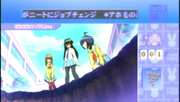





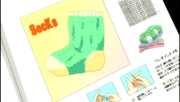




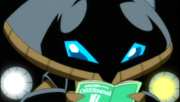


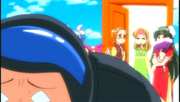



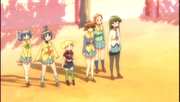





















































Your Opinions and Comments
Be the first to post a comment!